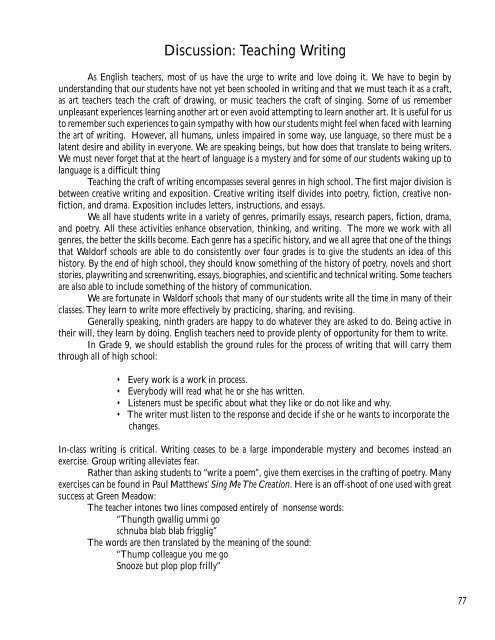Colloquium on English - Research Institute for Waldorf Education
Colloquium on English - Research Institute for Waldorf Education
Colloquium on English - Research Institute for Waldorf Education
You also want an ePaper? Increase the reach of your titles
YUMPU automatically turns print PDFs into web optimized ePapers that Google loves.
Discussi<strong>on</strong>: Teaching Writing<br />
As <strong>English</strong> teachers, most of us have the urge to write and love doing it. We have to begin by<br />
understanding that our students have not yet been schooled in writing and that we must teach it as a craft,<br />
as art teachers teach the craft of drawing, or music teachers the craft of singing. Some of us remember<br />
unpleasant experiences learning another art or even avoid attempting to learn another art. It is useful <strong>for</strong> us<br />
to remember such experiences to gain sympathy with how our students might feel when faced with learning<br />
the art of writing. However, all humans, unless impaired in some way, use language, so there must be a<br />
latent desire and ability in every<strong>on</strong>e. We are speaking beings, but how does that translate to being writers.<br />
We must never <strong>for</strong>get that at the heart of language is a mystery and <strong>for</strong> some of our students waking up to<br />
language is a difficult thing<br />
Teaching the craft of writing encompasses several genres in high school. The first major divisi<strong>on</strong> is<br />
between creative writing and expositi<strong>on</strong>. Creative writing itself divides into poetry, ficti<strong>on</strong>, creative n<strong>on</strong>ficti<strong>on</strong>,<br />
and drama. Expositi<strong>on</strong> includes letters, instructi<strong>on</strong>s, and essays.<br />
We all have students write in a variety of genres, primarily essays, research papers, ficti<strong>on</strong>, drama,<br />
and poetry. All these activities enhance observati<strong>on</strong>, thinking, and writing. The more we work with all<br />
genres, the better the skills become. Each genre has a specific history, and we all agree that <strong>on</strong>e of the things<br />
that <strong>Waldorf</strong> schools are able to do c<strong>on</strong>sistently over four grades is to give the students an idea of this<br />
history. By the end of high school, they should know something of the history of poetry, novels and short<br />
stories, playwriting and screenwriting, essays, biographies, and scientific and technical writing. Some teachers<br />
are also able to include something of the history of communicati<strong>on</strong>.<br />
We are <strong>for</strong>tunate in <strong>Waldorf</strong> schools that many of our students write all the time in many of their<br />
classes. They learn to write more effectively by practicing, sharing, and revising.<br />
Generally speaking, ninth graders are happy to do whatever they are asked to do. Being active in<br />
their will, they learn by doing. <strong>English</strong> teachers need to provide plenty of opportunity <strong>for</strong> them to write.<br />
In Grade 9, we should establish the ground rules <strong>for</strong> the process of writing that will carry them<br />
through all of high school:<br />
• Every work is a work in process.<br />
• Everybody will read what he or she has written.<br />
• Listeners must be specific about what they like or do not like and why.<br />
• The writer must listen to the resp<strong>on</strong>se and decide if she or he wants to incorporate the<br />
changes.<br />
In-class writing is critical. Writing ceases to be a large imp<strong>on</strong>derable mystery and becomes instead an<br />
exercise. Group writing alleviates fear.<br />
Rather than asking students to “write a poem”, give them exercises in the crafting of poetry. Many<br />
exercises can be found in Paul Matthews’ Sing Me The Creati<strong>on</strong>. Here is an off-shoot of <strong>on</strong>e used with great<br />
success at Green Meadow:<br />
The teacher int<strong>on</strong>es two lines composed entirely of n<strong>on</strong>sense words:<br />
“Thungth gwallig ummi go<br />
schnuba blab blab frigglig”<br />
The words are then translated by the meaning of the sound:<br />
“Thump colleague you me go<br />
Snooze but plop plop frilly”<br />
77

















